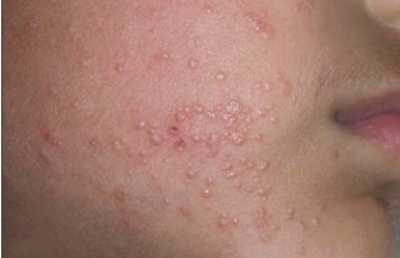Molluscum
What is Molluscum Contagiosum?
Are you tired of dealing with molluscum contagiosum? The condition is a common viral infection that causes raised bumps on the skin. While the bumps and lesions are usually painless, they can be annoying to deal with, especially if they spread. This infection is most common in children, but it can affect adults as well. In most cases, these bumps will go away on their own, but they can last between two months and four years.

What Causes Molluscum Contagiosum?
Molluscum contagiosum is a viral infection that you can get through touching. Children usually get the virus by playing with other children who are infected. While this virus is the most common in children, kids are not the only people who get molluscum contagiosum. When it comes to teens and adults, they can contact the virus through sexual contact. The virus has also been known to spread through contact sports that involve touching bare skin like wrestling or football. Equipment and other items like baseball gloves, wrestling mats, and football helmets can also spread the virus if they are worn or touched by someone who was infected with the virus. You can also cause the molluscum contagiosum to spread throughout your own body by scratching, shaving, or touching the bumps.Symptoms of Molluscum
If you or your child comes in contact with the molluscum contagiosum virus, it could take up to six months before you see any symptoms. The average incubation period is between two and seven weeks. When the symptoms start to appear, here is what the lesions will look like:
- They can appear alone or in a group
- The bumps are very small, shiny, and smooth
- White, pink, or flesh-colored
- Firm and shaped like a dome with a dent in the middle
- Bumps are small – typically under ¼ inch in diameter
- They may be itchy and can become red and inflamed
- They can appear anywhere except on the palms of hands or soles of your feet
- Bumps usually appear on the face, abdomen, torso, arms, armpits, and legs of children
- On adults, bumps usually appear on the inner thigh, genitals, and abdomen
Who is Most Likely to Get Molluscum Contagiosum?
Molluscum contagiosum is very common, so do not be surprised if you see someone with it or if someone in your family becomes infected. Anyone can get molluscum contagiosum, but certain types of groups are more likely to become infected than others.
- While this is most common in children, ages 1 to 10 are the most common for molluscum contagiosum kids.
- People who live in warm, humid climates where living conditions are crowded are at a greater risk for infection.
- People with a weakened immune system may easily become infected. Those that have HIV or cancer may develop growths that look different, are larger, and are more difficult to treat.
- People who have atopic dermatitis are at risk due to frequent breaks in the skin. If they get this infection, it will also be easier for them to spread molluscum contagiosum to other parts of their body because of these skin breaks.
- People who participate in contact sports like wrestling or football are also at a higher risk for infection.
Related Pages
- Treatment for Flaky Facial Skin from Dandruff and Rosacea
- Glytone
- Avene
- Microblading vs. Eyebrow Tattooing: What’s the Difference, and Why Does it Matter?
- Forehead Botox: Everything You Need to Know about the Cost, Risks, and Benefits
- Bellafill: A Long-Lasting, Effective Dermal Filler Solution
- Sebaceous Hyperplasia: Causes, Symptoms, and Treatment
- Laser Hair Removal: The Superior Alternative
- Neck Lift
- Wrinkle Treatment
- Molluscum
- Seborrheic Keratosis
- Mole Removal
- Actinic Keratosis
- Contact Dermatitis
- Itchy Scalp Treatment
- Atypical Nevi
- Hyperhidrosis Treatment
- Melasma Treatment
- Cysts Treatment
- Psoriasis
- Warts Treatment
- Eczema Treatment
- Seborrheic Dermatitis Treatment
- Rosacea Treatment
- Fungal Infections
- Hair Loss Treatment
- Acne Treatment
Quick Quote
Diagnosing Molluscum
A dermatologist can diagnose the infection just by looking at the bumps on your skin. If there is any doubt, a skin scraping, or biopsy can be performed to confirm the diagnosis. While treatment is not usually required, getting your molluscum contagiosum diagnosed will help rule out other causes for the lesions like skin cancer, chickenpox, or warts.
Molluscum Treatment Options
It is not necessary to treat molluscum. If you have a healthy immune system, the bumps will go away on their own over time. So, do not be surprised if your dermatologist does not recommend a treatment for you or your child. But there are some instances where treatment may be helpful like:
- Your lesions are large
- You have an existing skin disease like contact dermatitis
- You are concerned about the virus spreading
If you are a good candidate for treatment, a dermatologist will perform the procedure. Here are the most common ways to treat molluscum contagiosum:
- Cryotherapy – each bump can be frozen off with liquid nitrogen
- Curettage – the bump will be pierced and then scraped off the skin
- Laster therapy – each bump will be destroyed by a laser
- Topical therapy – a cream or chemical will be applied to the bumps and cause the top layer of the skin to peel off
Keep in mind, most of these methods involve treating each bump. So, the procedure may require more than one session.
Your Skin is Our Passion at Winston Salem Dermatology
If you are worried about you or your child’s molluscum contagiosum, give us a call. At Winston Salem Dermatology, we live by the motto – Your Skin, Our Passion. No matter what age you may be, or what skin condition you are faced with, we will do everything we can to find your skincare solution. We don’t just specialize in adult skin. We have a professional team of skincare specialists who are educated and specially trained to treat children with different types of skin conditions. We will check out your areas of concern and recommend the best treatment. Give us a call today at (336) 774-8636.
Related Pages
- Treatment for Flaky Facial Skin from Dandruff and Rosacea
- Glytone
- Avene
- Microblading vs. Eyebrow Tattooing: What’s the Difference, and Why Does it Matter?
- Forehead Botox: Everything You Need to Know about the Cost, Risks, and Benefits
- Bellafill: A Long-Lasting, Effective Dermal Filler Solution
- Sebaceous Hyperplasia: Causes, Symptoms, and Treatment
- Laser Hair Removal: The Superior Alternative
- Neck Lift
- Wrinkle Treatment
- Molluscum
- Seborrheic Keratosis
- Mole Removal
- Actinic Keratosis
- Contact Dermatitis
- Itchy Scalp Treatment
- Atypical Nevi
- Hyperhidrosis Treatment
- Melasma Treatment
- Cysts Treatment
- Psoriasis
- Warts Treatment
- Eczema Treatment
- Seborrheic Dermatitis Treatment
- Rosacea Treatment
- Fungal Infections
- Hair Loss Treatment
- Acne Treatment
Quick Quote
Address
Winston Salem Dermatology & Surgery Center
1400 Westgate Center Drive,
Suite 200 - Winston Salem, NC 27103
Phone: 336.774.8636
Fax: 336.774.0265
www.WinstonSalemDermatology.com



